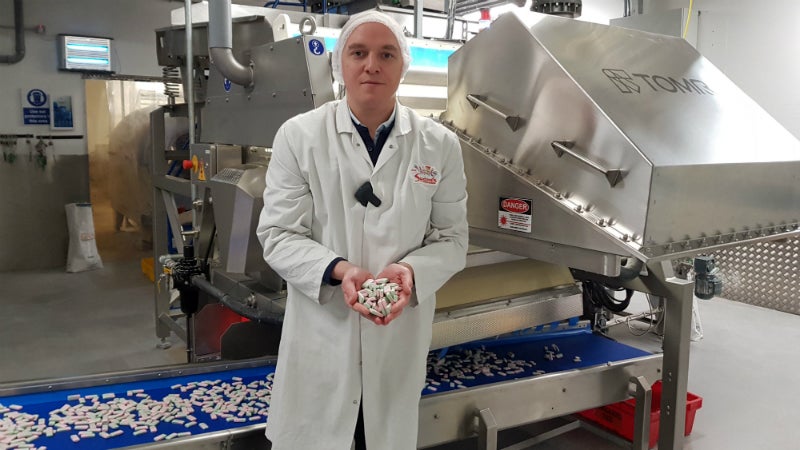TOMRA’s Nimbus Sorter Automates Confectionery Sorting at Swizzels Matlow

Swizzels Matlow has chosen TOMRA’s Nimbus optical sorter to automate the sorting process of its Drumstick Squashies to meet fast-growing demand while ensuring the consistently excellent quality of the product.
Swizzels is one of the longest-running sugar confectionery factories in the world, having celebrated its 90th anniversary in 2018. It produces heritage brands such as Love Hearts.
Based in Derbyshire, the factory employs more than 500 people and covers 20,000m2. In 2018, it produced 20,000t of Love Hearts, Refreshers, Drumstick Lollies, Double Lollies, Parma Violets, Rainbow Drops and Drumstick Squashies.
Only the best confectionery for the customer
Swizzels have chosen TOMRA’s Nimbus optical sorter to handle the delicate sorting operation of its Drumstick Squashies. The growing popularity of the sweet has led to a fast increase in demand.
Business unit manager at Swizzels Matlow Matt Whatcott said: “We used manual labour to remove any imperfect sweets that may have been created during the process. Our desire to provide only product of the highest quality to our consumers drove us to seek an alternative solution to manual sorting in order to improve the effectiveness whilst also delivering cost benefits to the business,”
The proof is in the confectionery
The director of TOMRA’s UK agent Stein Solutions Nicolas Stein knew that the Nimbus optical sorter would be the perfect solution for Swizzels. He said: “We invited them to the TOMRA Demonstration Center in Belgium so they could try the Nimbus on their product and see first-hand how effective and easy to use it is. The Nimbus is used for a variety of products, but Swizzels were one of the first to test the machine in this specific application.”
The machine was quickly delivered and has been operating at the Swizzels’ facility for a year.
State-of-the-art technology for reliable detection
The Nimbus represents a new generation of sorting solutions that separate products in free-fall. The product is fed onto a vibratory conveyor that spreads the Drumstick Squashies evenly and in a single layer. It then goes into a free-fall and passes the scanning area, where several technologies are combined to detect different types of defects such as mis-shaped sweets or multiple sweets joined together.
During the free-fall, the product is inspected with laser scanning technology to identify contaminated products or foreign objects that are not visible to the naked eye. Special high-resolution cameras developed by TOMRA sort the product based on colour and outline. In addition, the Nimbus can separate the articles by biological characteristics. This combination of technologies perfectly addresses the challenge of reliably detecting imperfect products.
When a defect is detected, a powerful burst of air removes the imperfect product from the stream. It is then inspected a second time to make sure no good product is rejected.
Matt Whatcott explains: “Before using a TOMRA sorter, we used manual labour to remove any imperfect sweets that may have been created during the process. The task was challenging due to sweets passing by the manual inspection operators with one side face-down on a conveyor. This meant that it was not always possible for them to identify a defect as the inspection only covered around 60% of the surface area of the sweets. The inspection task was also monotonous, meaning that focus could wane over time.
“TOMRA’s Nimbus has enabled us to establish a more automated production line with greater rigour around the quality inspection of our product. We have much higher confidence in our ability to supply sweets that are only of the optimum standard to our consumers.”
Focus on the customer’s specific requirements
The Nimbus sorter is also a very good fit with Swizzels’ space and operational requirements.
Nicolas Stein explains: “The footprint of the machine was also critical, since the space available in the factory was very limited, and the Nimbus is a very compact machine which can handle a high product throughput.”
Another advantage of the machine is that it was designed and proven in dusty environments, making it particularly well suited for conditions at the Swizzels factory which can become dusty with the starch. It is also easy to maintain and operate, as the free-fall principle means there are no moving parts on the machine.
A satisfied customer
Matt Whatcott concludes: “TOMRA’s Nimbus has enabled us to establish a more automated production line with greater rigour around the quality inspection of our product. We have much higher confidence in our ability to supply sweets that are only of the optimum standard to our consumers. It has allowed us to achieve a more consistent, high-quality product, develop our business and meet the demand of our consumers.”
Find out more at www.tomra.com/food.
